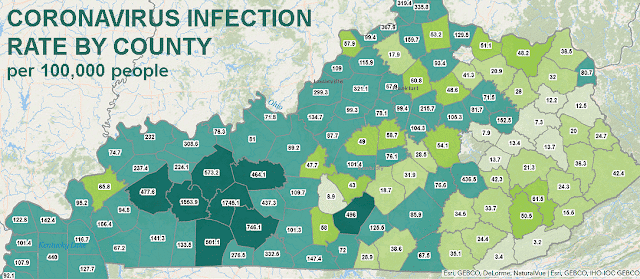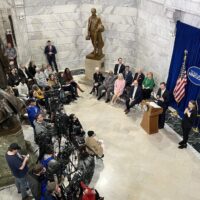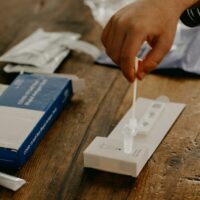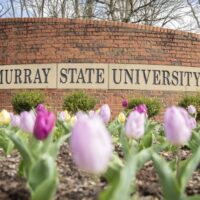Coronavirus cases in Kentucky spiked Friday, to levels not seen in two weeks, but Gov. Andy Beshear said it’s too early to reach conclusions from that.
The state reported 283 new cases, more than double the average of the last two weeks.
“I don’t want to suggest that it means something either way,” Beshear said.

He said the jump may have been created by testing laboratories finally catching up from delays of the Memorial Day weekend. He said the average for the last four days was 158, which “is still a decline, and a significant decline from two weeks ago.”
Beshear said the counties with more than five new cases were Jefferson, 62; Fayette, 41; Warren, 31; Gallatin, 18; Kenton, 17; Shelby, 16; Boone, 12; Logan, 11; Campbell, 10; and Allen and Franklin, seven each. Beshear said the Fayette cases appear to be driven by an outbreak at the federal prison there. The day’s numbers brought the state’s total to 9,464, at least 3,231 of whom have recovered.
The governor reported nine more deaths from COVID-19, for a of total of 418. Six were in Butler County, which has the state’s highest infection rate, 17.46 per 1,000 residents; they were three women, aged 70, 83 and 90; and three men, 51, 74 and 88. The others were a 55-year-old man in Oldham County and two men in Gallatin County, 64 and 68.
Beshear gave his daily report by race, which included the figure that 17.8 percent of Kentucky’s deaths have been among African Americans, more than twice their 8.4% share of the state’s population. He said those numbers and the civil unrest in Louisville over police actions reflected “the vestiges of slavery, segregation and Jim Crow. … This pandemic we’re facing has laid bare the inequities that still exist in our society and many times are fatal.”
He said the march that included the shooting of seven people “started with a very peaceful protest” that was “one of the safest, one of the most compliant with CDC guidelines” for gatherings in the pandemic, but was disrupted by “a rogue element.” Later, he said “There are groups out there that want to create a violent situation. Let’s not let groups like these Three Percenters, these extremists, turn people against each other and create violence.”
Health Secretary Eric Friedlander said the state has tested 15,000 residents and employees of long-term-care facilities, and expects to test 50,000 to 60.000. He said residents of personal-care homes are being tested as well as those in nursing homes.
Lexington’s WKYT-TV reported that the 63-bed Parkside Manor personal-care home in Cynthiana has had 24 cases of the virus, including three staffers, and three residents are hospitalized.
Beshear said 77 more residents and 27 more staffers had tested positive in long-term-care facilities, for respective totals of 1,285 and 600. They have had 244 deaths, including two staffers, accounting for 58.3 percent of the state’s deaths. Fifteen deaths were added to the total yesterday, from previous daily reports.
The River’s Bend Retirement Community in Kuttawa, which had the first major outbreak among long-term-care facilities, reported that its three staff members and six residents who had tested positive have recovered, leaving no active cases remain at the facility, two residents of which died.
“Mass testing allowed us to detect, isolate, and stop the spread of the disease in our community. This early intervention was the key to ensuring the health and safety of everyone at our facility,” River’s Bend said in a press release. “While friends and family are not permitted to enter the facility to visit, we have set up ‘visitation stations’ outside for safe social interactions with residents.”
In other COVID-19 news Friday:
- Beshear acknowledged a spike in drug overdoses as a result of the pandemic. The Lexington Herald-Leader reported that Fayette County had 42 percent more overdoses in April than in April 2019.
- On a tour of hospitals to thank health care workers for their efforts during the pandemic, and to “tout federal virus-relief aid sent to Kentucky,” Senate Majority Leader Mitch McConnell “preached the importance of wearing masks in public,” Bruce Schreiner reports for The Associated Press. “There should be no stigma attached to wearing a mask,” McConnell said during an appearance in Owensboro. “And even among age groups that are least likely to either contract this disease or die from it, you could be a carrier. So I think what we all need to do is say, ‘OK, I’m going to take responsibility, not only for myself but for others.’”
- Behsear announced that people whose driver’s licenses expired or were lost after March 18, the date of his emergency order extending them for 90 days, will be able to get new licenses by mail from their circuit court clerks. He said more information would be coming from the Administrative Office of the Courts.
- Two studies in the British medical journal The Lancet show how dangerous the virus is for current and former cancer patients, AP reports. The first, of patients in the U.S, Spain and Canada, found that half of 928 current and former cancer patients with the virus were hospitalized, and 13% died. The second study found that 800 patients in England with various types of cancer and the virus had a death rate of 28%. The risk increased if the patients had other health problems. Dr. Jeremy Warner, a Vanderbilt University data scientist who led the larger study, told AP that the results show the wisdom of measures that many hospitals have taken to delay or modify care for many cancer patients, and the need for people treated in the past to be extra careful now. Kentucky leads the nation in the rate of people who get cancer and the rate of people who die from it.
- Other recent studies show that the U.S. is a long way from “herd immunity” to protect Americans from COVID-19, the New York Times reports. Epidemiologists say that while the herd immunity threshold for COVID-19 is still uncertain, they believe it will be reached when 60% to 80% of the population has been infected and develops resistance. So far, the best current estimates show that only 20% of people in New York City, which has been hit hard with the virus, have antibodies to the virus; in Boston, it’s 10%.
- The Lexington Herald-Leader offers up two stories to help you make the best decisions around getting your hair cut and getting your pet groomed during the pandemic. The Louisville Courier Journal examines returning to the gyms, which are allowed to open Monday, June 1.
- Researchers from the University of Kentucky, as part of the Covid-19 Prevention Project, are asking Kentuckians from all walks of life to take a 15-minute, confidential survey that will ask about your efforts to protect yourself from the coronavirus and your sense of risk for getting it. Click here to take the survey.





